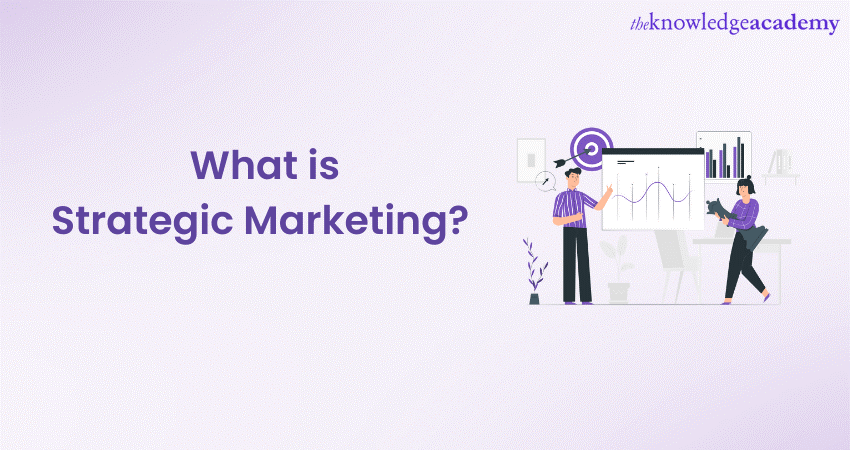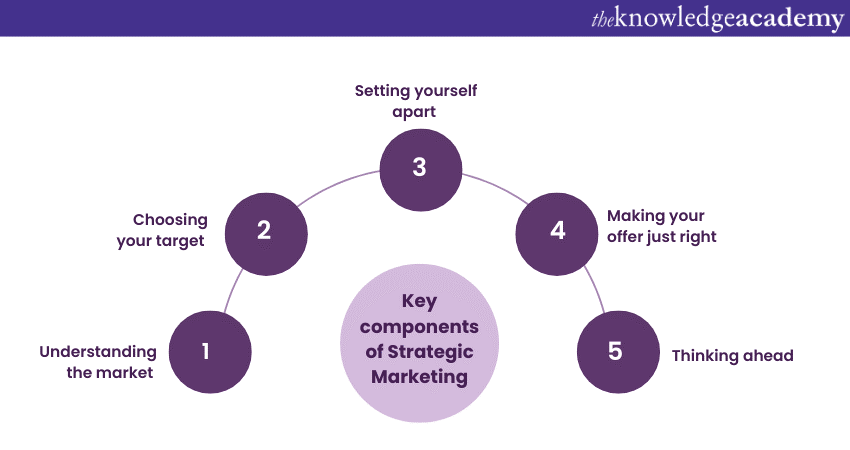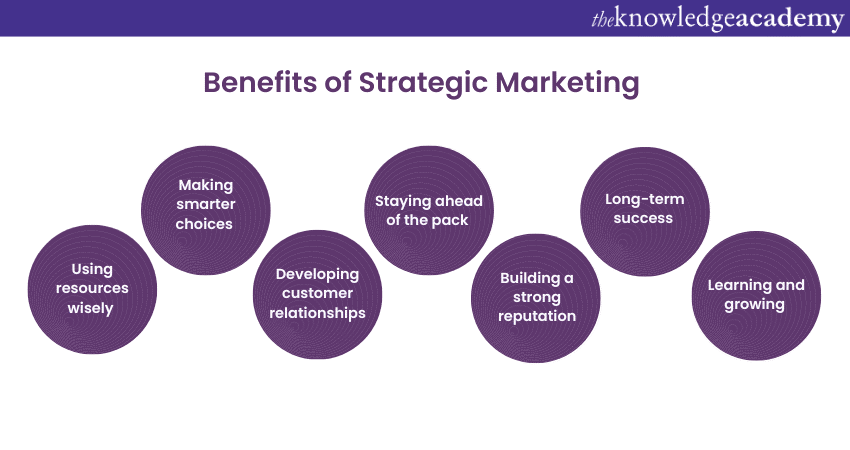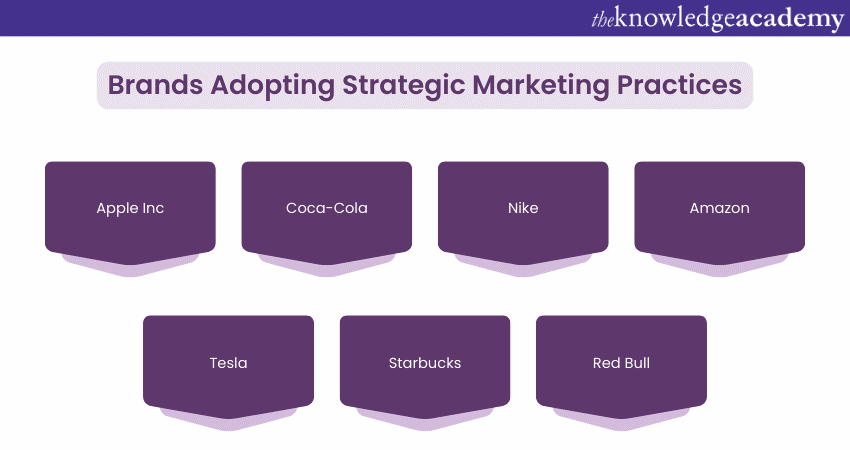We may not have the course you’re looking for. If you enquire or give us a call on +918037244591 and speak to our training experts, we may still be able to help with your training requirements.
Training Outcomes Within Your Budget!
We ensure quality, budget-alignment, and timely delivery by our expert instructors.

A time where every brand vies for attention, the question arises: “What is Strategic Marketing?” Take it as the master key that unlocks the potential of businesses to meet and exceed customer expectations. Strategic Marketing is the blueprint for building meaningful connections, the strategy behind every successful campaign, and the voice that speaks directly to the heart of the market. But what makes it so vital in the grand chessboard of commerce?
This blog will illuminate the core of Strategic Marketing, answering the pressing question, “What is Strategic Marketing?” with clarity and insight. It will reveal how it shapes the narratives that captivate consumers and forge lasting relationships. Read more to uncover its principles, and its ability to catapult a brand from obscurity to prominence.
Table of Contents
1) Definition of Strategic Marketing
2) Importance of Strategic Marketing
3) Key Components of Strategic Marketing
4) Benefits of Strategic Marketing
5) Techniques Used for Strategic Marketing
6) Examples of Successful Strategic Marketing
7) Conclusion
Definition of Strategic Marketing
Strategic Marketing can be defined as the strategy of developing, communicating, and delivering value to customers. It does so while achieving organisational objectives. It involves developing a well-structured plan that connects market research, segmentation, targeting, and positioning. It effectively allocates resources and shapes marketing efforts.
Unlike tactical or operational marketing, which focuses on short-term activities, Strategic Marketing takes a holistic and forward-looking approach to ensure sustainable success. This strategy is designed to utilise on opportunities, mitigate risks, and stay ahead in an ever-changing marketplace.
Importance of Strategic Marketing
Strategic Marketing plays a crucial role in aligning an organisation’s objectives and necessities. Here are several benefits that businesses can derive from Strategic Marketing:
a) Market Penetration Made Simpler: By dissecting the market and grasping its current operational worth, a company can establish a solid base for its products.
b) Enhanced Accessibility: Through the prioritisation and analysis of the target audience, a business can forge connections with the appropriate demographic. Additionally, this marketing approach expands the consumer base by meticulously addressing the audience’s requirements.
c) Establishment of Enduring Objectives: Unlike traditional marketing, which gets lost in a sea of incessant product promotion, Strategic Marketing zeroes in on the target. It cultivates pertinent awareness via dedicated campaigns, thereby simplifying the process for companies to define and realise their ambitions.
d) Intelligent Resource Management: Resources such as time, finances, talent, and others can be squandered if not managed prudently. No enterprise can sustain itself over time without judicious resource allocation. Strategic Marketing Planning enables a company to achieve maximum results with minimal resource expenditure.
e) Sales Amplification: Ultimately, for any organisation, the end goal is to enhance profits and outpace competitors. Strategic Marketing accomplishes this by increasing the pool of potential customers.
Key Components of Strategic Marketing
After learning What is Strategic Marketing, it’s time to learn about its key components. The key components of Strategic Marketing are the foundational building blocks that pave the way for business success. Here are the major components discussed in detail:

Understanding the Market
This is about getting to know the market you're operating in – understanding who your potential customers are, what they want, and how they behave. It involves studying the audience so you can talk to them in a way that helps in targeting.
Choosing your Target
Not everyone is your customer, and that's okay! Strategic Marketing helps you pick the specific group of people you want to reach out to – those who are most likely to be interested in what you offer.
Setting Yourself Apart
Imagine you're at a party, and you want to stand out. Strategic Marketing helps your brand or product shine by showing what makes it unique. This way, when people think about what you offer, they remember you in a special way.
Making the right offer
Think of this like cooking – you need the right ingredients in the right amounts to make a delicious dish. In Strategic Marketing Management, this means finding the right mix of product features, pricing, where to sell, and how to talk about it.
Thinking Ahead
When planning a road trip, you want to know where you're headed and how you'll get there. Similarly, Strategic Marketing helps you plan for the long run to stay on track even if the road changes along the way.
Transform your marketing strategy with captivating video content – sign up for our Video Marketing Masterclass today!
Benefits of Strategic Marketing
There are various benefits of Strategic Marketing that one should keep in mind before planning for your next marketing strategy. Let's have a detailed look at each one of them:

Using Resources Wisely
Imagine having a limited budget for a party. You'd want to spend it on things that really matter, right? Strategic Marketing helps businesses use their money, time, and people in the smartest way possible, focusing on things that bring the best results.
Making Smarter Choices
Think about having a magic crystal ball that tells you what's going to happen. Strategic Marketing isn't magic, but it's pretty close! It gives businesses valuable information about customer's needs, competitors, and market trends. This makes decision-making much easier and more accurate.
Developing Customer Relationships
Just as we all seek companions who recognise and value us, Strategic Marketing enables businesses to gain a profound comprehension of their clientele. It’s akin to conversing in their dialect, catering to their necessities, and ensuring their contentment.
Staying Ahead of the Pack
Imagine you're in a race, and you know a shortcut that others don't. That's what Strategic Marketing does – it helps you stand out from your competitors by showing off your strengths and unique qualities. This way, you're not just in the race; you're leading it.
Building a Strong Reputation
Just like a good reputation makes you popular, Strategic Marketing helps build a reputation for your business. When you consistently deliver what you promise, people trust you more. This trust turns into a solid reputation that attracts even more customers.
Long-term Success
Think about planting a tree. You don't expect it to grow overnight, but with care and patience, it becomes strong and provides shade for years. Strategic Marketing is like nurturing a business for the long run. It focuses on gradual growth and stability rather than quick but temporary gains.
Learning and Growing
Like a student who's always learning, Strategic Marketing helps you understand what's happening around you. You learn from the market, your customers, and your own successes and mistakes. This means you keep getting better over time.
Techniques Used for Strategic Marketing
Strategic Marketing stands as a beacon that guides companies towards sustainable growth and competitive advantage. It involves a blend of innovative tactics and analytical approaches that align with the core values and goals of an organisation. Here’s a closer look at some of the key techniques that propel Strategic Marketing forward:
1) Brand Storytelling
Brand storytelling is a powerful narrative technique that weaves the company’s values, mission, and purpose into a cohesive story. It aids to create an emotional connection with the audience, making the brand memorable and relatable. Effective storytelling can differentiate a brand in a crowded market and foster loyalty.
2) Digital PR
Digital PR involves managing a brand’s online presence by creating buzz and building relationships with online journalists, bloggers, and influencers. It’s about crafting compelling stories and distributing them across digital platforms to enhance brand visibility and credibility.
3) Surround Sound Method
The Surround Sound Method is about creating a consistent brand message across multiple channels to envelop the target audience. By ensuring the brand is present wherever the audience turns, it increases the chances of conversion and reinforces brand recall.
4) Brand Extension
Brand extension refers to the tactic of using an existing brand name for new product categories. This leverages the brand’s established market presence and reputation to introduce new offerings, thereby reducing the risk associated with new product launches.
5) Podcasting
Podcasting has emerged as a personal and engaging medium for brands to share their stories, insights, and expertise. It enables direct communication with the audience and can be a great tool for building a community around the brand.
Take control of your marketing spend today – sign up for our Marketing Budget Course and learn to maximise ROI with expert guidance!
6) Video Marketing
Video marketing denotes the use of video to market and promote market products or services, educate consumers and customers, boost engagement on digital and social channels, and reach the audience with a new medium. It’s highly engaging and can convey complex information in an easily digestible format.
7) Influencer Collaborations
Influencer collaborations include partnering with individuals who have a significant following on social media platforms. Such influencers can sway the opinions of their followers, making them an asset for brands looking to expand their reach and authenticity.
Examples of Successful Strategic Marketing
Strategic Marketing is the art of turning vision into reality, often making its mark through campaigns that resonate with consumers on a wider level. Let's explore a few remarkable instances where this marketing style propelled brands to new heights:

1) Apple Inc
Apple is a vital example of a company that has mastered Strategic Marketing Goals. From the launch of the iPod to the iPhone and beyond, Apple has consistently positioned itself as an innovative and premium brand.
The "Think Different" campaign sums up this ethos, emphasising uniqueness and breaking away from the norm. Apple's marketing focuses on simplicity, design, and user experience, creating a strong emotional connection with its audience.
2) Coca-Cola
Coca-Cola's Strategic Marketing journey has showcased adaptability in the face of changing consumer preferences. While maintaining its iconic image, Coca-Cola has shifted its marketing approach to align with health-conscious trends.
The "Share a Coke" campaign, which replaced its logo with popular names, encouraged personalisation and engagement. Also, the company has invested in promoting its lower-sugar and zero-calorie options to cater to health-conscious consumers. This strategic shift allowed Coca-Cola to retain its emotional connection with customers.
3) Nike
What is Strategic Marketing technique Nike adopted? It is centred around emotional branding and empowerment. The "Just Do It" campaign has become synonymous with the brand's identity, motivating individuals to push their limits. Nike has effectively positioned itself as more than just a sportswear company; it's a symbol of inspiration and achievement.
By partnering with athletes and celebrities, Nike positioned itself with success and determination. The brand's consistent messaging and focus on innovation have contributed to its enduring success.
Create, captivate, convert - Join our Content Marketing Course and elevate your marketing game!
4) Amazon
Amazon's Strategic Marketing revolves around customer-centricity and convenience. By focusing on offering a vast selection of products, quick delivery, and a seamless shopping experience, Amazon has placed itself as the go-to online marketplace.
The introduction of Amazon Prime, with its advantages like quick shipping and access to digital content, incentivised customer loyalty. Amazon's recommendation algorithms and personalised shopping suggestions further enhance the user experience, fostering a sense of trust and reliability.
5) Tesla
Tesla's Strategic Marketing stands out for its disruptive approach within the automotive industry. By positioning electric vehicles as not just eco-friendly choices but also high-performance and technologically advanced options, Tesla has challenged traditional perceptions.
The company's CEO, Elon Musk, plays a significant role in building the brand's aura and driving excitement. Tesla's strategic use of social media, especially Twitter, has kept enthusiasts engaged and invested in the brand's progress and innovations.
6) Starbucks
Starbucks has employed Strategic Marketing to create a global coffee culture and community. Using cosy store designs, consistent branding, and the customisation of orders, Starbucks offers more than just coffee; it offers an experience.
The company's seasonal promotions and loyalty program, the Starbucks Rewards, incentivise repeat business and drive customer engagement. Starbucks' focus on sustainability and ethical sourcing has also resonated with socially conscious consumers, further enhancing its brand reputation.
7) Red Bull
Red Bull's Strategic Marketing is synonymous with extreme sports and high energy. The company has managed to transcend the energy drink market by creating a lifestyle brand centred on adventure and excitement.
Red Bull's sponsorship of extreme sports events, such as the Red Bull Air Race and X Games, aligns perfectly with its brand identity. The "Red Bull Gives You Wings" slogan along with its association with daredevil stunts have positioned the brand as a symbol of limitless energy and enthusiasm.
Conclusion
We hope this blog has uncovered What is Strategic Marketing, its power to reach and resonate with the audience. It’s the strategic foresight that positions a brand not just in the market, but in the minds and hearts of consumers. With these fundamentals in hand, any business can navigate the marketplace with confidence and creativity.
Discover the strategy behind buying decisions - join our Marketing Courses today and gain a competitive edge!
Frequently Asked Questions

The five Steps of the Strategic Marketing Process include setting a mission, analysing the situation, creating a marketing plan. It further involves developing marketing mix decisions, and implementation of the processes.

Evaluating a Marketing strategy involves analysing key metrics, including the Return on Investment (ROI), sales growth, customer feedback, and market share. It includes assessing how well the strategy aligns with business goals, and its effectiveness in reaching target markets.

The Knowledge Academy takes global learning to new heights, offering over 30,000 online courses across 490+ locations in 220 countries. This expansive reach ensures accessibility and convenience for learners worldwide.
Alongside our diverse Online Course Catalogue, encompassing 17 major categories, we go the extra mile by providing a plethora of free educational Online Resources like News updates, Blogs, videos, webinars, and interview questions. Tailoring learning experiences further, professionals can maximise value with customisable Course Bundles of TKA.

The Knowledge Academy’s Knowledge Pass, a prepaid voucher, adds another layer of flexibility, allowing course bookings over a 12-month period. Join us on a journey where education knows no bounds.

The Knowledge Academy offers various Marketing Courses, including the Strategic Marketing Course, Marketing Research Training, and Video Marketing Course. These courses cater to different skill levels, providing comprehensive insights into Advertising Campaign.
Our Digital Marketing Blogs cover a range of topics related to Strategic Marketing, offering valuable resources, best practices, and industry insights. Whether you are a beginner or looking to advance your Digital Marketing skills, The Knowledge Academy's diverse courses and informative blogs have got you covered.
Upcoming Digital Marketing Resources Batches & Dates
Date
 Digital Marketing Course
Digital Marketing Course
Fri 24th Jan 2025
Fri 28th Mar 2025
Fri 23rd May 2025
Fri 25th Jul 2025
Fri 26th Sep 2025
Fri 28th Nov 2025







 Top Rated Course
Top Rated Course



 If you wish to make any changes to your course, please
If you wish to make any changes to your course, please


